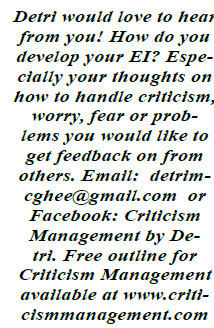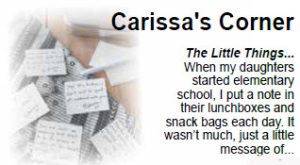Perhaps you have heard the definition of FEAR as False Evidence Appearing Real. All too often that is true. Those who describe themselves as “worriers” sometimes see that as a sign that they truly care or have a lot of control over the outcome. For some, it is almost a bragging statement. For others, it is a cry for help, an admission that they wish they could conquer. You can turn from a worrier to a warrior if you want to.
If you are a “worrier,” I would love to hear from you. Why do you practice that lifestyle? I am NOT being facetious or flippant. I am genuinely interested in the reasons that people continue to hold on to that way of handling life. I would like to better understand that life-choice.
Today, I would like to share a few things I recently re-learned from a couple of articles I read. FEAR is often thought of as a sign of weakness or lack of faith. But, King David, “a man after God’s own heart,” spoke of his fear often! What did he mean? How could a man with his power and God-given calling still have fear? Perhaps because this world is full of things that can scare us and scar us.
When just a young boy, my youngest son loved to sneak up behind me and scare me! That brought a feeling of “fear” into my mind, although briefly. Hearing that you or someone you love has been diagnosed with a serious illness brings a whole other kind of fear to us. Knowing you are facing serious and painful surgery is yet another emotion. What about being called upon to give a speech in front of a crowd, or facing an appointment at the dentist for a root canal, or considering that one day you will die?
Or like my husband just this morning: Stepping just outside our entryway door and stepping on a 4-foot snake! I heard his “fear” quite well!
How do we deal with fear? Is there a way to be less fearful, less worried, less stressed?
 First: Admit your fears in order to properly address them! There is a human propensity toward FEAR. Learning to limit the responses and time that fear affects us is key to EI (Emotional Intelligence).
First: Admit your fears in order to properly address them! There is a human propensity toward FEAR. Learning to limit the responses and time that fear affects us is key to EI (Emotional Intelligence).
Next: Recognize fear is a sign. Being afraid is not cowardice: It’s a natural human response to the unknown. New tasks bring new opportunities, but not without some trepidation. The key is to not allow fear to keep us from moving forward or making changes/trying new things. Facing fear head-on usually causes the fear to flee.
Sometimes fear can be avoided. But at what cost? If you fear public speaking, just be prepared! Know your topic no matter who you are talking to. Get training if this is something you are called to do on a regular basis.
My great uncle was maestro of the Toronto Symphony Orchestra many years ago. When my parents were attending a performance of his in Memphis, Dad expressed some apprehension on going back stage to meet such famous people as the opera cast. My short, round Italian Uncle Ernesto said, “Oh, Jack! They just like you – me…they put their pants on one leg at a time. And all they know is opera! They don’t know nothing about farming, or horses!!!” It put Dad at ease. He was meeting PEOPLE! And, not those “higher” or more important than he was.
What about avoiding fear by refusing to take on new things? Then, it costs promotions, experiences, and self-confidence. But, if you take them on you risk failure. And you risk success. Deep failure and high success are both met with disdain. Only mediocrity lessens criticism. That might explain a lot.
Consider what you really fear most — failure or success? If you fail, you can try again or give up. If you succeed, you can do the same. Many people fear success more than failure because they know that with failure, you are more likely to get sympathy. With success, REAL SUCCESS, you gain a whole new set of enemies. I understood that better when I heard someone talking about a super-winning football team: “I hope they LOSE! I’m so sick of them always winning?”
Realize, too, that fear shows you care. Anxiety over asking someone on a date, or going for a job interview, or learning to drive. They CARE about the consequences.
This article doesn’t even touch on all the important aspects of FEAR. Fear itself is neither good nor bad. It is much more important to learn to harness this naturally human response and learn ways to use it for your benefit. BYW: That is a big part of developing EMOTIONAL INTELLIGENCE. It isn’t a quick fix, but some of the remedies and coping mechanisms and tools to effectively control fear are not that difficult. Like opening a child-proof medicine bottle, you just need to know how!
Would you like to hear more on this subject? Do you disagree or want to share a different perspective? Message me on Facebook: Criticism Management by Detri.
Detri would love to hear from you! How do you develop your EI? Especially your thoughts on how to handle criticism, worry, fear or problems you would like to get feedback on from others. Email: detrimcghee@gmail.com or Facebook: Criticism Management by Detri. Free outline for Criticism Management available at www.criticismmanagement.com
By: Detri McGhee – CLU, ChFC







